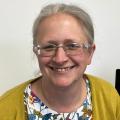HEALTH visitors are taking their place on the frontline of the battle to support vulnerable families with new babies during the coronavirus outbreak.
Keyworker Laura Gordon is part of the team looking after families with young children in Inverclyde as they face unprecedented times.
In her role Laura, pictured, gives advice on everything from breastfeeding to sleeping and cares for the mental wellbeing of new mums.
But she is also using her links to help anyone in need of food parcels or financial aid during these troubled times.
With new parents denied the crucial support of loved ones during lockdown, health visitors have used virtual links to keep in touch.
The health visitor, who has worked in the community for a number of years, said: "Family life has changed massively since the pandemic began, and many families are under even more pressure than normal.
"Having a new baby is a huge transition and at this time most parents don’t have the support they would normally rely on.
"They can feel isolated and overwhelmed.
"Having somebody to turn to during this time is extremely important and contributes to the ongoing safety and wellbeing of their children.”
There are also many local families on low incomes, with people affected by underlying health conditions.
The area has also suffered the highest rate of Covid-19 deaths in the country, making it challenging for frontline workers.
They have had to reduce contact time and rely more on phone calls.
Laura added: "Inverclyde is among the most deprived areas in Scotland and some families experience challenging circumstances.
"They may have specific and urgent health needs without necessarily knowing what’s available and how to access the appropriate support.
"We can help them with that and facilitate access - this support can often provide lifelines when families are most in need.”
On a day-to-day basis home visits have had to be reduced, but Laura remains in the community doing face-to-face consultations at least two to three days per week.
Laura said: “The way we engage with patients may have changed due to COVID-19, but we are all still here, and we are all still working within the communities to help families access the services they need."






Comments: Our rules
We want our comments to be a lively and valuable part of our community - a place where readers can debate and engage with the most important local issues. The ability to comment on our stories is a privilege, not a right, however, and that privilege may be withdrawn if it is abused or misused.
Please report any comments that break our rules.
Read the rules here